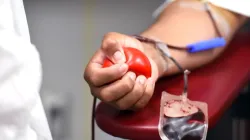World Blood Donor Day 2024: Common myths about blood donation
As we celebrate World Blood Donor Day 2024, it's essential to dispel common myths about blood donation. Misinformation can deter potential donors, but clearing up these misconceptions can encourage more people to donate, ultimately saving more lives.

Every year on June 14th, the world celebrates World Blood Donor Day. This year, the theme is "Celebrating 20 years of giving: thank you blood donors!" It's a day to recognize the selfless act of blood donation and encourage more people to join the life-saving cause.
However, many misconceptions and myths still surround blood donation, preventing potential donors from contributing. Let's address some of the most common myths and shed light on the facts:
Myth 1: Donating blood is painful
One of the most common misconceptions about blood donation is that it is a painful process. While the thought of a needle can be daunting, the reality is that most donors experience only a brief pinch or sting when the needle is inserted. The entire process is overseen by trained professionals who ensure the donor's comfort and safety. Any discomfort is minimal and short-lived, far outweighed by the satisfaction of knowing you've helped save a life.
Myth 2: You can only donate once a year
Many people mistakenly believe that they can only donate blood once a year. In reality, the frequency of donation depends on the type of donation. For whole blood donations, individuals can donate every 56 days or roughly every two months. Platelet donors can give more frequently, often every two weeks, up to 24 times a year. It’s important to follow the guidelines provided by healthcare professionals to ensure donors remain healthy.
Myth 3: Blood donation takes a long time
Another myth that deters potential donors is the belief that donating blood is a time-consuming process. While the entire visit to a donation centre may take about an hour, the actual blood collection only takes about 10-15 minutes. This short-time investment can make a significant impact on the lives of those in need of blood transfusions.
Myth 4: People with tattoos or piercings can't donate
A widespread but incorrect belief is that individuals with tattoos or body piercings cannot donate blood. The truth is, as long as the tattoo or piercing was done at a state-regulated entity using sterile needles and the procedure is fully healed, donors are usually eligible after a waiting period of 3-12 months, depending on local guidelines. Always check with your local blood donation centre for specific eligibility criteria.
Myth 5: Older adults can't donate blood
Age alone does not determine blood donation eligibility. As long as the donor is in good health, there is no upper age limit for donating blood. Donors must meet health requirements, and older adults who are healthy and meet the other criteria are encouraged to donate.
This World Blood Donor Day, let's work together to spread accurate information, dispel myths, and encourage more people to become regular blood donors. By doing so, we can ensure a stable and safe blood supply, ready to save lives whenever and wherever it's needed.
ALSO READ: World Blood Donor Day 2024: Essential dos and don'ts after donating blood